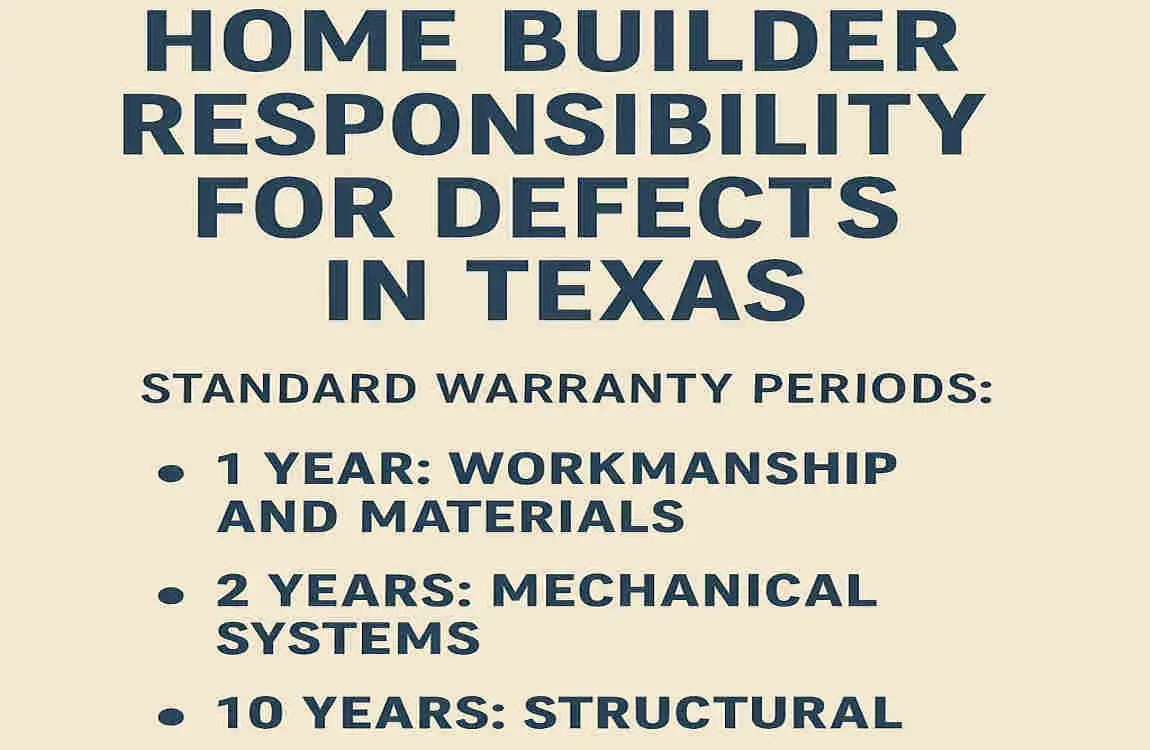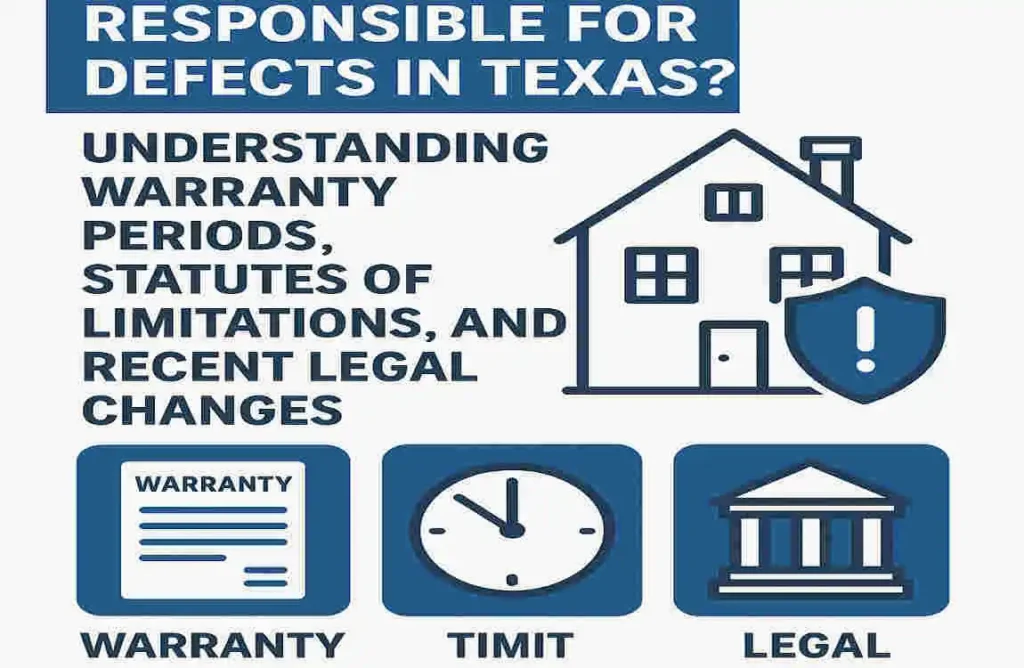Buying a new home is one of the most exciting and nerve-wracking experiences you can go through. You want everything to be perfect, but what happens if you find defects in your new home? In Texas, home builders have specific responsibilities for addressing these issues. Understanding these responsibilities, including warranty periods and legal limitations, is crucial for every homeowner.
The Standard Warranty Periods in Texas

Understanding Builder Warranties
When you buy a new home in Texas, the builder typically provides a warranty to cover defects that may arise. These warranties vary in length and scope, depending on the type of defect. Let’s break down the standard warranty periods you can expect in the Lone Star State.
The Impact of Texas House Bill 2024 (HB 2024)
Before we dive into the specific warranty durations, it’s important to mention a recent change in Texas law that has significantly impacted builder responsibilities. In 2023, the Texas legislature passed House Bill 2024 (HB 2024), which made some significant changes to the warranty periods for new homes. We’ll discuss this in more detail later, but keep it in mind as we explore the standard warranty periods.
Specific Warranty Durations
Now, let’s look at the specific warranty durations you can expect in Texas:
Six Years for Structural Defects
When it comes to the big stuff, like the foundation, load-bearing walls, and beams, builders in Texas are typically responsible for defects for six years. This means if you discover a problem with these structural elements within six years of buying your home, the builder should fix it at no cost to you.
One-Year Warranty on Workmanship and Materials
For issues related to artistry and materials, such as faulty paint jobs or leaky windows, builders usually provide a one-year warranty. If you find these types of defects within the first year of owning your home, the builder should come and make things right.
Two-Year Coverage for Plumbing, Electrical, and HVAC Systems
Finally, for the essential systems in your home, like plumbing, electrical, and HVAC, builders typically offer a two-year warranty. This means if your toilet starts running or your air conditioner breaks down within two years of moving in, the builder should be responsible for fixing it.
Recent Updates and Their Influence
As mentioned earlier, the passage of HB 2024 in 2023 has significantly impacted builder responsibilities in Texas. This law shortened the warranty period for structural defects from 10 years to 6 years in many circumstances. We’ll explore this change in more detail in Section 3, but it’s essential to keep in mind as you consider the standard warranty periods.
Statutes of Limitations for Defects in Texas
What Are Statutes of Limitations?
In addition to warranty periods, it’s crucial to understand statutes of limitations in construction defect cases. A statute of limitations is a law that sets a time limit for filing a legal claim. In the context of home defects, it means there’s a deadline for taking legal action against your builder if they don’t fix a problem.
Time Limits for Filing Claims in Texas
In Texas, the statute of limitations for filing a claim for construction defects is typically 4 years from the date of discovery. This means if you find a defect in your home, you have four years to take legal action against the builder if they refuse to fix it.
Latent vs. Obvious Defects
It’s worth noting that the statute of limitations can vary depending on whether the defect is latent (hidden) or obvious. For latent defects that you couldn’t reasonably have discovered right away, the four-year clock may not start ticking until you actually find the problem.
The Importance of Timely Action
Understanding the statute of limitations is crucial, as missing the deadline may mean you lose your right to take legal action against the builder. That’s why it’s so important to act quickly if you discover a defect in your home. We’ll discuss more about protecting yourself as a homeowner in Section 4.
Recent Legal Changes and Their Effect on Builder Responsibilities

Overview of Recent Legislation
As mentioned earlier, the passage of HB 2024 in 2023 has significantly impacted builder responsibilities in Texas. This law made several key changes to homeowners’ warranty periods and legal protections.
Shortening the Liability Period
One of the most significant changes brought about by HB 2024 is the shortening of the liability period for structural defects from 10 years to 6 years in many circumstances. This means builders are now responsible for fixing structural issues for a shorter period than before.
Impact on Third-Party Warranty Programs
HB 2024 also affected third-party warranty programs, which builders often use to provide additional coverage for homeowners. The law clarified that these programs are subject to the same six-year liability period as builders themselves.
Potential Future Legal Trends
As with any area of law, the landscape of builder responsibilities in Texas is constantly evolving. There may be future legal changes or pending legislation that could further impact warranty periods and homeowner protections. It’s essential to stay informed about these developments to ensure you’re fully protected as a homeowner.
How to Protect Yourself as a Homeowner
Tips for Ensuring Warranty Coverage
Now that we’ve covered the legal landscape, let’s talk about some practical steps you can take to protect yourself as a homeowner in Texas. Here are some tips for ensuring you get the warranty coverage you deserve:
- Document defects and report them promptly: If you discover a defect in your home, document it with photos and a written description, and report it to your builder as soon as possible. This will help establish a clear record of the issue and when you found it.
- Understand builder disclosures and warranty policy specifics: Before buying a home, carefully review the builder’s disclosures and warranty policy. Make sure you understand what’s covered and for how long. Don’t hesitate to ask questions if anything is unclear.
- Seek legal advice if necessary: If you’re having trouble getting your builder to fix a defect, or if you’re unsure about your legal rights, consider seeking advice from a qualified attorney who specializes in construction law.
The Role of Dispute Resolution
In some cases, you may need to go through a formal dispute-resolution process to have a defect fixed. Many builders have a process in place for handling disputes, which may involve mediation or arbitration. If you find yourself in this situation, it’s essential to understand your rights and options under the dispute resolution process.
